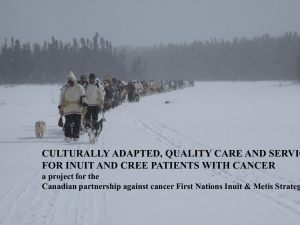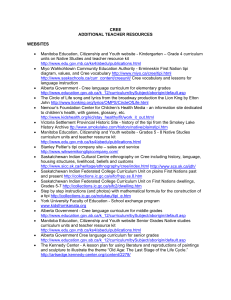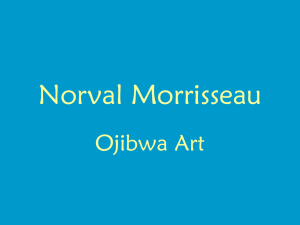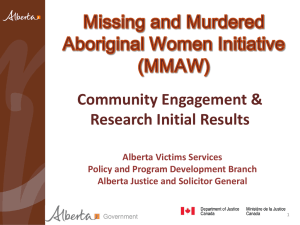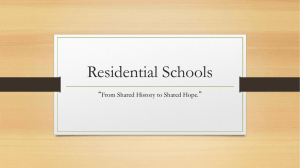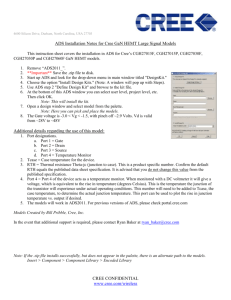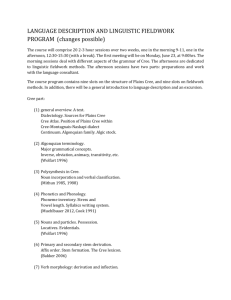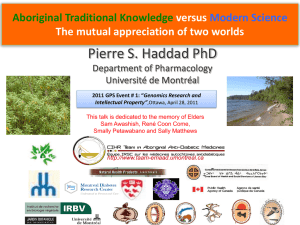Break-outs on School Initiatives - Manitoba First Nations Education
advertisement
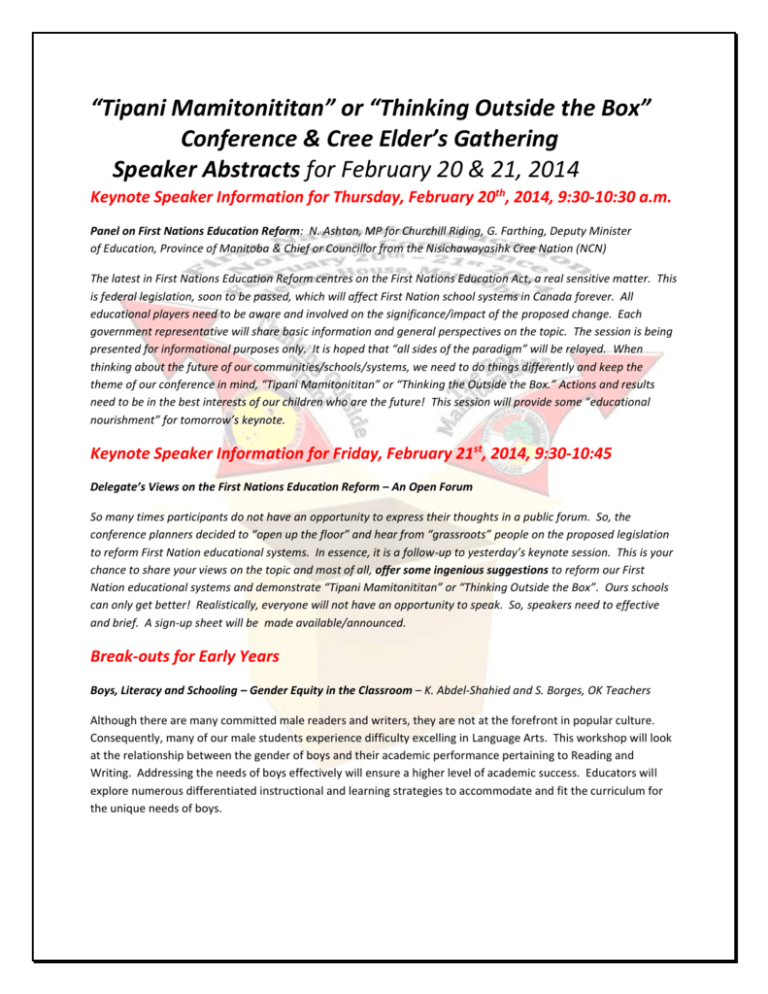
“Tipani Mamitonititan” or “Thinking Outside the Box” Conference & Cree Elder’s Gathering Speaker Abstracts for February 20 & 21, 2014 Keynote Speaker Information for Thursday, February 20th, 2014, 9:30-10:30 a.m. Panel on First Nations Education Reform: N. Ashton, MP for Churchill Riding, G. Farthing, Deputy Minister of Education, Province of Manitoba & Chief or Councillor from the Nisichawayasihk Cree Nation (NCN) The latest in First Nations Education Reform centres on the First Nations Education Act, a real sensitive matter. This is federal legislation, soon to be passed, which will affect First Nation school systems in Canada forever. All educational players need to be aware and involved on the significance/impact of the proposed change. Each government representative will share basic information and general perspectives on the topic. The session is being presented for informational purposes only. It is hoped that “all sides of the paradigm” will be relayed. When thinking about the future of our communities/schools/systems, we need to do things differently and keep the theme of our conference in mind, “Tipani Mamitonititan” or “Thinking the Outside the Box.” Actions and results need to be in the best interests of our children who are the future! This session will provide some “educational nourishment” for tomorrow’s keynote. Keynote Speaker Information for Friday, February 21st, 2014, 9:30-10:45 Delegate’s Views on the First Nations Education Reform – An Open Forum So many times participants do not have an opportunity to express their thoughts in a public forum. So, the conference planners decided to “open up the floor” and hear from “grassroots” people on the proposed legislation to reform First Nation educational systems. In essence, it is a follow-up to yesterday’s keynote session. This is your chance to share your views on the topic and most of all, offer some ingenious suggestions to reform our First Nation educational systems and demonstrate “Tipani Mamitonititan” or “Thinking Outside the Box”. Ours schools can only get better! Realistically, everyone will not have an opportunity to speak. So, speakers need to effective and brief. A sign-up sheet will be made available/announced. Break-outs for Early Years Boys, Literacy and Schooling – Gender Equity in the Classroom – K. Abdel-Shahied and S. Borges, OK Teachers Although there are many committed male readers and writers, they are not at the forefront in popular culture. Consequently, many of our male students experience difficulty excelling in Language Arts. This workshop will look at the relationship between the gender of boys and their academic performance pertaining to Reading and Writing. Addressing the needs of boys effectively will ensure a higher level of academic success. Educators will explore numerous differentiated instructional and learning strategies to accommodate and fit the curriculum for the unique needs of boys. Early Development Instrument - S. Komishin, MFNERC Specialist How well students do in school can be determined by how ready they are for the expectations placed on them at grade 1. If children are not ready for the expectations placed on them in grade 1, it creates a learning gap that can be very difficult to change. The EDI is a tool used to report on populations of children in different communities, assess strengths and needs in children’s early childhood, and predict how children will do in school. EDI results reflect the strengths and needs of children’s communities, related to how they prepare children for school. The EDI is collected for children in either Junior or Senior Kindergarten and assesses 5 developmental areas. In this session participates will learn about how this data collection can be used for school planning and for community planning to better support children and their families. Learning Through Play-Developing & Utilizing Learning Centres - K. Abdel-Shahied & S. Borges, OK Teachers This workshop is designed to support educators in gaining an understanding of the value related to learning through collaborative & hands-on learning centres. In this workshop, we will look at the benefits attributed to utilizing learning centres as a daily component of learning in the primary classrooms & how they may be modified to fit the structure of the junior & intermediate classroom. This workshop will explore: the value & elements of “play” as central to student learning, strategies for using “play-based” curriculum & learning centres with early/middle years. “Pisim Finds Her Miskanow” – W. Dumas, Cree Cultural Coordinator for NEA, K. Brownlee, Curator of Archaelogy at the Museum of Man & Nature & Dr. M. Sitchon, Co-researcher Presently, there is very little locally developed material available for students to study their history, language and culture which has caused “disorientation” in the lives Aboriginal People. The Elders have insisted for years that Aboriginal youth of today need to be orientated in their Miskanow (holistic Path). Aboriginal youth need to know where they come from to know where they are at and where they come from, if they know where they are going and plan successful career paths. Presenters will share the methods they have used to develop local resource materials so Rocky Cree children and other students can study their Miskanow. The hope is that other communities will start to develop their own materials in orienteering their youth. Roots of Empathy (ROE) - T. Long (OK Resource Teacher) & K. Campbell (OK Teachers) To present the goals of Roots of Empathy which are to develop empathy towards others & to prevent bullying in schools. The presentation will illustrate how ROE is helpful in teaching children respect & care for one another. The program emphasizes how all people are unique & by observing the stages of development of an infant & how people develop at their own rate. Visual Arts in the Classroom - E. de Munnik (OK Art teacher) Discover dynamic strategies for teaching visual arts to students of all ages & abilities. Learn new ideas to combine technology along with fostering the development of the creative mind through individual & collaborative centres. The SmartBoard software and art activities will be experienced along with sharing behaviour management ideas and learning the elements of art beside technology. Activities will include: introduction to drawing a figure, line experiments and cartoon expression. Let’s experiment and create! Self-Regulation – S. Komishin, MFNERC Specialist How well students do in school can be determined by how well they are able to self-regulate. Self-regulation is essential for enabling children to respond efficiently and effectively to the everyday challenges they face in and out of school. The development of self-regulation happens in the early years and it lays the foundation for higher cognitive functions later in life. We can foster the development of self-regulation in the early years. What is PAX & how can it help students & teachers? - A. Flatfoot & S. Wastesicoot, EY’s Specialists at MFNERC PAX means peaceful, productive, healthy & happy. Every human being wants PAX & any human simply will not learn well & live well without PAX. This includes the students in your classroom & the adults in your school. The presenters will explain why & how of the PAX game, as a simple routine three to four times a day, grows PAX brains & behaviour in everyone. The PAX good behavior game will make a lifetime of difference to students to students. Presenters will give examples of different strategies that teachers can use with their students in their classrooms. Break-outs for Middle & Senior Years High School Initiatives—C. Condappa, NNOC Science Teacher General information on three initiatives being implemented at the high school will be shared by the presenter. Information shared may help others to initiate such programs in your areas. The presenter is the staff advisor for NNOC’s Junior Chief & Council which has been in existence for the past few years. The presenter will focus on Jr. Chief and Council, the sturgeon project & the recycling program. Integrating Youth/Skateboard Culture into Learning/Living - B. Peterson, NNOC Art Teacher This workshop will present the benefits of bringing youth culture into the classroom. Using skateboard culture as a vehicle for learning about physics, woodworking, design, marketing & branding, students are able to see how interdisciplinary skills can serve them in the 21st century work force. Locally-Developed Courses for Culturally Relevant Education – S. Maitland, NNOC Social Studies Teacher This workshop will examine the development of a school-initiated course on the history of medicine, as well as engaging student learning through thematic studies. Reader’s Workshop – M. Monias & C. Plaisier, MFNERC ELA Specialists This workshop will provide teachers with a framework t use when teaching the reading process to students. This model uses whole class mini lessons, small group instruction, one on one conferencing and independent work t experience and master the reading process. This model encourages & emphasizes the very important connection between reading & writing, and is perfect for using classroom-based formative assessment. This model is used in multi-grade & multi-level classrooms in First Nations with successful results, due to the ownership students feel when they choose their own reading & maintain their reading logs & notebooks. 21st Century Technology for 21st Century Learners - B. Petersen, NNOC Art Teacher Integrating media technologies acquaints students with critical skills to creatively express themselves. This workshop highlights the benefits of equipping students with this voice & how it prepares them for the 21 st century work place. Using Archeology in the Classroom - K. Brownlee (Curator, Museum of Man & Nature) & Dr. M. Sitchon, Coresearcher Survival depends on a person’s ability to understand & use the resources available in their surrounding environment. Generations of First Nation peoples have shared this knowledge through teachings & oral histories, a tradition that is still followed today. This knowledge is also found in the artifacts that archaeologists study which are the result of invention and innovation by First Nation Peoples over thousands of years. Different tools were used to harvest resources, aid in transportation, and keep people warm, even in the coldest weather. Archaeologists recreate this understanding from a blending of knowledge from diverse sources that include interviews with members of Aboriginal communities, historic journals, archives, & ethnographies. In this workshop, the presenters will share ways in which archaeology can be used in the classroom as a powerful tool in the education of Aboriginal youth to instill a sense of pride and identity. Using Plays in the Senior High Classroom - A. Busch, ELA Teacher at NNOC This workshop will involve interactive participation among the audience, so don’t be shy! How can you use plays written by Aboriginal and mainstream playwrights t make your classes engaging, exciting and fun? Get ready to laugh out loud! Valuing & Mapping Our Stories to Enhance our Learning Spaces – Dr. L. Fitznor, Assistant Professor, Dept. of Educational Administration, Foundations & Psychology, University of Manitoba The presenter will discuss & share personal experiences in developing & leading “critical foundations” for effective learning of Aboriginal/Indigenous perspectives. Participants will learn more & attain practical ideas. Research will be sited. This session will be of interest to individuals who seek new ways to transform their teaching, or find validation in what they may already be doing. Some successful teaching strategies related to community knowledge strengths, equity, diversity, holistic thinking & critical thinking will be demonstrated. Break-outs with a Cree Focus Accelerated Second Language Acquisition a.k.a. Greymorning Method – K. Lewis Accelerated Second Language Acquisition (ASLA) is teaching language using pictures & photographs. ASLA is for all, from beginner to advanced. In this session, Cree will be the Second Language so participants will have an idea on how to use this method. ASLA has been used with languages all over the world. Arapaho Scholar Dr. Stephen Greymorning made this popular with his nation and there are several First Nation community schools that are using this with great success. BYKI (Before You Know It) - K. J. Fontaine, MFNERC Language Specialist In 2008 the Aboriginal Languages Initiative launched an assessment of how First Nations Language Teachers utilize Information Technology in their language instruction and within their language programming. Six years later the language program at MFNERC has witnessed great change within this specific area. To date they have developed a language program called BYKI in partnership with Transparent Languages based out of New Hampshire. The BYKI program has involved all five language groups present within Manitoba which is as follows: Cree (OCN N Dialect) Ojibway o Central Dialect (Sandy Bay) o NE Dialect (Sagkeeng) Oji-Cree (Island Lake Dialect) Dakota (Sioux Valley) Dene (Tadoule Lake) This presentation will entail reviewing the beginnings of this assessment and will look at how the First Nations Language unit has developed its’ IT Strategy to date. Games, Stories and Songs for Learning Cree – D. Day & R. Cook, Cree Consultants Playing & singing is an enjoyable way to learn Language. This workshop will give ideas you can use in the class to promote use of Cree in the classroom while having fun. Ideas include: charades of animals/birds in the Cree language, puppet story (create one together as a group with the puppets available-then perform the puppet story), bingo in Cree (with prizes), songs with actions. iPads and Education – D. Pegus and J. Williams This session will be a brief introduction to the iPad in the classroom with a focus on apps and language. Syllabics/Syllabic Numerals – C. Houle The Cree Syllabics workshop is about teaching language and literacy. Reading and writing syllabicds is a great way to help students learn Cree because it promotes whole brain learning. There is an added benefit when teaching syllabics in where you have symbols that are geometric in shapes. Problem solving and math skills are involved with this session, Syllabics Numerals will also be shared. This is a great way to teach numbers using syllabics. “Tapwetamowin”: Spirituality and Law Captured as the Basis of Cree Self-Determination – J. Wastesicoot, Ph. D Candidate, University of Manitoba The session focuses on Cree Self-Government and it discusses Aboriginal spirituality and law & how these two concepts are understood & reflected under a Cree traditional governance model. This research explains “Tapwetamowin” and what this means to the Cree Elders in northern Manitoba. The research captures & documents the Elders’ oral history, together with Euro-Canadian literal evidence, specifically the multi-volumes of the Jesuits Relations and the thousands of Hudson’s Bay Company manuscripts. While the research was conducted specifically with Cree Elders, the unifying themes have shared commonalities with other indigenous cultures. Teacher’s Panel on Teaching Cree – D. Day, an OEA Teacher, Mystery Lake Teacher, one other educator Four teachers will respond to questions relating to the Rewards, Challenges and Expectations of teaching Cree with leading questions: -What is the best thing about teaching the Cree language? -How have the past policies of repression against our languages & culture affect teaching the language today? -What is expected of you as a Cree Language teacher & how can you meet the expectations? Total Physical Response (TPR) – Second Language Teaching Methodology – C. Houle Total Physical Response (TPR) is exactly what it sounds like. The Cree Vocabulary that is being taught is used in conjunction with movement. The instructor will say the words & everyone will repeat & do the actions. This allows the brain to register the meaning while going through the verbs. This method is a great fit with Cree because of all the verbs we have in our language. There is no writing needed for TPR, participants learn by listening, seeing, saying & doing. Break-outs on Educational Leadership A Discussion on Supports Needed for Northern First Nation School Administrators - G. Gossfeld-McDonald & N. Tays, NNOC/OK Principals, G. Ross- MFNERC, D.Swanson-Frontier Superintendent Northern First Nation (FN) School Administrators (Principals/Vice-Principals) need to come together to mingle & discuss what is needed so they can do the best they can do in their schools. Focus will be on strengths, challenges & next steps. Info gathered from northern FN Principals/Vice-Principals will be compiled for recommendations on additional professional development. Break-outs of a General Nature Inspiration –L. Condappa, NNOC Guidance Counsellor And here I am-with – (1) Vision (2) gustatory (3) olfactory (4) Auditory (5) Tactile – and the ability to perform all physical activities with all limbs and often times we complain! This is inspiration. Personal Wellness – G. Dumas & Medicine Lodge staff, no info at time of printing The Power of the Mind – J. Hunter, Finance Comptroller, ATEC, NCN Unleash your greatest power! By becoming aware of the potential power that is within you, you can begin t change the circumstances of your life, this begins first with awareness. This workshop will teach you how to become more aware of the power of your mind and how to use that power to your greatest advantage. Break-outs on Resource Programming Reading & Spelling Difficulties? Is it Dyslexia? – C. Hoffmann, KC Dyslexia Learning Centre What is dyslexia? Warning signs, what works, classroom accommodations, co-existing conditions & what you can do? Break-outs on School Initiatives Buffalo Riders Program – A. M. Spence, NNADAP Coordinator, NCN & C. Sawatsky, NNADAP Counsellor & P. Miller, OK Counsellor The National Native Alcohol and Drug Abuse Program (NNADP) is an example of a Health Canada program now largely controlled by First Nations communities and organizations. The program’s goal is to help First Nations and Inuit communities set up & operate programs aimed at reducing high levels of alcohol, drug and solvent abuse among on-reserve populations. The Buffalo Riders Program is an early intervention program for both students and parents. It focuses on taming the emotional brain and taking full control of where you are headed. Riding a buffalo is symbolic with balance and controlled direction. Buffalo Riders are skilled at balance and self-direction, they have tamed something huge. The workshop will focus on group discussions, hands on activities and group participation. It is hoped that the group will offer you as much or more than you offer the group, through sharing of your thoughts, feelings and wisdom. The goal of the buffalo Riders program is on intervention, which participants can use to help their youth learn how to tame their emotional mind (the buffalo) and ride into a new and more balanced direction. Developing a Successful Mathletics Programme in the Classroom – A. Kasap & N. Lang, (OK Teachers) Mathletics, an on-line math programme, is an excellent vehicle for getting all students excited about mathematics. The workshop will show how the programme works, how to get students keen about it, and how it easily increases interest and involvement in the classroom math programme. Differentiation is massive as teachers can determine at which level to place each student in Mathletics; no students are aware of their actual levels. Each class of students and indeed the entire school has become excited and motivated about Math. In less than half a year, teacher feels that the average student has improved ten to fifteen percent in their classroom math grades. Presenters will share how this has been possible. One Laptop Per Child (OLPC): Education Technology for Aboriginal Youth – J. Martino & A. Gordon One Laptop Per Child (OLPC) Canada enhances access to learning centred technology among Aboriginal Youth. To date, OLPC Canada has provided more than 3800 laptops to Aboriginal youth 6-12 years of age in rural, remote & urban communities in seven provinces & two territories. We are seeking to add additional educational programs to our growing initiative. If you would like to try out the latest educational technology & learn how your students may benefit from the OLPC Canada program, this workshop is for you! Power Mechanics and Driver Education in Your School – L. Condappa, NNOC Guidance Counsellor & D. Thomas, NNOC Teacher & Certified Driver Education Instructor Presenters will illustrate how to get Power Mechanics and Driver Education started in your school. Power Mechanics is a half-credit course while Driver Education is a non-credit course. They will provide a fun-filled (and fact-filled) session detailing the specifics of each segment of the program, modifications that can be made and other interesting elements of the two programs that can be offered at First Nations schools in Manitoba. Logistical concerns for operating a program and meeting Department of Education and Manitoba Public Insurance guidelines will also be covered. Nelson House Teacher’s Association (NHTA) Professional Development Committee – F. Flett, OK Teacher & PD Chair & W Spence, NHTA President, no info available at time of printing The Duke of Edinburgh’s Award-Getting Youth Engaged in Themselves – Sgt. R. Cooke & J. Tuomi, Awards Officer Finding ways to engage youth in different aspects of their lives can sometimes be challenging. Our program provides youth with the opportunity to gain new perspective, try new activities, give back and work towards healthy habits - all while getting recognized for it! The Duke of Edinburgh’s Award is an International challenge achievement program designed to give all youth between the ages of 14-24 the structure to develop as a young person. Earning a Duke o Edinburgh’s Award has far reaching benefits for the youth within your community. It gives them a way to stand out among the rest on applications for: bursaries and scholarships, post-secondary school or trade programs, and career employment. Come learn more about this great program and the ability it has to meet the needs of all young people, in any community since it is adaptable and available to all youth. See how it is already helping the youth in northern Manitoba communities, showcasing the success in Nelson House. The T.R.U.T.H. Card Project - Mr. R. Day & Mr. B. Badiuk, OK School Teachers The genesis, implementation & on-going progress of a unique positive reinforcement program that includes ALL grades at OK will be presented. The program incorporates Aboriginal teachings & staff is encouraged to participate. Break-outs on School Success Planning Building a Community of Hope – M. Dumas and S. Cordell Workshop will cover the way in which a community school is built. It will cover the key components of a community school. The research has shown that when parents, schools and community work together, students have a higher rate of success. At the heart of the community school partnership is a commitment to supporting students, families and the surrounding community in a way that helps everyone succeed. We will present a model. Land-based Education/Experiential Learning – D. MacDonald, NNOC Phys/Health Educator This three hour session will enable participants to take part in the land-based education program developed between the NEA and the Jack Moore Traditional Program. From traditional crafts to medicines and trapping, you will be involved. Land-based education gives students a chance to learn in many different social, physical & emotional areas while enjoying the experience and the sense of challenge. Defining Culturally Competent Education – W. Dumas, R. Francois, W. Spence, N. Yetman, OK/NNOC Educators The beauty of being a Culturally Competent Educator on a First Nation is that, it is based on Native and non-Native educators being bi-cultural and in some cases bilingual. It is the concept of learning not to blame and not feeling defensive but finding an honest perspective in the “disorientation” of present day Aboriginal youth. In this workshop, presenters will define, as a group, what they think Cultural Competence is. They will define respective boundaries for all to operate from and develop in their own expertise. It will be an honest examination of issues on why Aboriginal students are not succeeding and how we can find alternate methods of success in the curriculum. Come, be prepared to offer positive solutions! Emergency Preparedness – Dealing with Crisis - J. McBain-OK Vice-Principal, Middle Years, R. Arthurson-MFNERC Since the 1993 massacre at Columbine High school in Colorado, we have developed a heightened awareness of the degree of vulnerability that both students and educators face each day. Threats to the safety of our schools are at an all-time high. All administrators and staff need to be fully prepared. This session will look at Emergency Preparedness Planning, the roles and responsibilities of all school employees, the role of the community, addressing the aftermath of a crisis through counselling and therapy and the vital role of communication. This workshop will allow participants to learn the important components of emergency response planning and enjoy an interactive, team-based approach on handing a wide range of crisis scenarios. Identifying Core/Exit Outcomes – D. Lang, OK/NNOC’s Curriculum Co-ordinator Have you ever encountered the situation where you become frustrated and want to say to your students, “you were supposed to learn this last year!”? In this workshop, you will learn how to identify the essential, or core, outcomes in the Math and ELA curricula. This will ensure that all the major/essential outcomes are taught each grade, and that no gaps occur from year to year. A continuum is created and the students never again miss out on the core outcomes. Mathematics and the Medicine Wheel – M. Hart & P. Courchene, MFNERC Numeracy Specialists The Medicine Wheel was placed on Turtle Island by people thousands of years ago. The circle of the Medicine Wheel is continuous, with no beginning and no end. Everything in life is scared-the earth, animals, plants… everything affects one another. The Medicine Wheel is a tool can be used in the classroom to help increase student engagement and retain material when presented in a hands-on inquiry based environment. This session will focus the numeracy concepts of a Medicine Wheel using hands on activities. “Misewa Pimatisawin” – W. Buck, MFNERC Science Specialist This presentation is aimed at the concepts of energy, metaphysics, astrophysics and First Nation perspectives. The premise is All Cultures had/have deep roots in science from the hands-on to the philosophical & theoretical… Break-outs on School Issues Best Teaching Practices for Educational Assistants – A. Mercredi & J. Tait, Special Education Specialists, MFNERC Educational Assistants (EA) are important providers of instruction for students that require extra help & are sometimes faced with limited opportunities for formal training, yet expectations for their roles & responsibilities are high. This session will focus on providing effective practices t meet the skills required for the EA’s in providing assistance to students. It will also touch on the roles & responsibilities of the EA. School Justice: An Issue for Collaborative Action – B. Petersen & S. Maitland, NNOC Teachers This workshop will focus on improving school ethos and by extension, student morale. Addressing the increasing presence of LGBT & gender issues in the school environment will be a focus in this initiative as well as collaborative development of school charters and codes of conduct. Social Media Awareness – Respect and Understanding – D. Turner How does the rise of Social Media play a role in our day to day lives? Teachers are constantly under the watch of students, parents, administrators and school boards. This session will focus on Social Media awareness: how we can better understand the way Social Media affects our profession and the implications regarding privacy, freedom of expression and potential discipline by an employer. Using Data to Improve Student Retention – C. Spence (MFNERC Unit Leader, Thompson) & M. Hart, (MFNERC Math Specialist) This session provides an overview of student retention; including barriers to school completion and identifying students at risk. The session ends with a summary on strategies and programs for improving school completion. Break-outs on Services/Programs to Schools Aboriginal Education Directorate Services – H. Settee-Robinson, Director The presenter will share helpful information/resources on all the services available from this Department of Manitoba organization. Skills Canada Programs – B. Marlow, Northern In-School Program Officer Skills Canada offers a variety of exciting programs for students in grades 6-12 in the north, most are FREE! Information on the innovative programs (showcases, extreme sledding competition, young women’s conference, career planning, etc.) that is available will be presented. Wapaskwa Virtual Collegiate–Re-shape & Re-design Your High School Programs by Including e-LearningH. Burston, Director of Information & Technology, MFNERC Come and learn about the Wapaskwa Virtual Collegiate (WVC) and how you can incorporate e-Learning seamlessly into your school. Over 800 First Nation students in grades 9-12 have transitioned into WVC’s synchronous learning environment since its inception. Students are fully supported throughout the semester by certified, experienced teachers for the live classes. Students gain access to increased course selection & access to specialty courses that many schools are unable to offer. Your First Nation school appoints a staff member & holds the key to this successful partnership by becoming the WVC’s school facilitator. Developed courses for grades 9-12 will be showcased so that you can see & experience our courses from a student perspective. Make an informed decision to “think outside the box” and include WVC in your future school planning. Break-outs for Parents Only First Nation Family Literacy: Audrey Fourre, Elma Arthurson, Family Literacy Specialists & Holly Fontaine, IRTC Specialist First Nation Family Literacy Specialists will showcase the recently developed Cree Immersion Family Literacy project to students and their families from Nisichawayasihk Cree Nation. Manitoba First Nation Education Resource Center staff will participate in introducing each center. Instruction would be delivered in Cree by staff who speak the language to participating families. Families will be greeted by MFNERC staff and register at each event using a “password”. Families will engage in each center with their children and receive a stamp for their passports. Families registered will participate in parental, child and teacher community engagement at each of the centers. It will offer insight into “Thinking Outside the Box” when it comes to Family Literacy (prizes or gifts will be awarded to participants).
